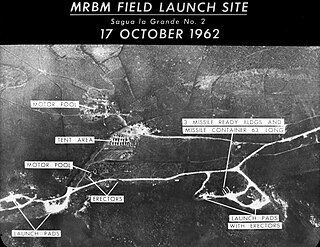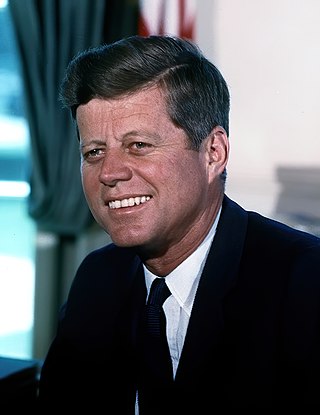Related Research Articles

The Cuban Missile Crisis, also known as the October Crisis in Cuba, the Caribbean Crisis in Russia, or the Missile Scare, was a 35-day confrontation between the United States and the Soviet Union, which escalated into an international crisis when American deployments of missiles in Italy and Turkey were matched by Soviet deployments of similar ballistic missiles in Cuba. Despite the short time frame, the Cuban Missile Crisis remains a defining moment in national security and nuclear war preparation. The confrontation is often considered the closest the Cold War came to escalating into a full-scale nuclear war.

The Partial Test Ban Treaty (PTBT) is the abbreviated name of the 1963 Treaty Banning Nuclear Weapon Tests in the Atmosphere, in Outer Space and Under Water, which prohibited all test detonations of nuclear weapons except for those conducted underground. It is also abbreviated as the Limited Test Ban Treaty (LTBT) and Nuclear Test Ban Treaty (NTBT), though the latter may also refer to the Comprehensive Nuclear-Test-Ban Treaty (CTBT), which succeeded the PTBT for ratifying parties.

Nikita Sergeyevich Khrushchev was the First Secretary of the Communist Party of the Soviet Union from 1953 to 1964 and chairman of the country's Council of Ministers from 1958 to 1964. During his rule, Khrushchev stunned the communist world with his denunciation of his predecessor Joseph Stalin's crimes, and embarked on a policy of de-Stalinization with his key ally Anastas Mikoyan. He sponsored the early Soviet space program, and enactment of moderate reforms in domestic policy. After some false starts, and a narrowly avoided nuclear war over Cuba, he conducted successful negotiations with the United States to reduce Cold War tensions. In 1964, the Kremlin leadership stripped him of power, replacing him with Leonid Brezhnev as First Secretary and Alexei Kosygin as Premier.
Operation Anadyr was the code name used by the Soviet Union for its Cold War secret operation in 1962 of deploying ballistic missiles, medium-range bombers, and a division of mechanized infantry to Cuba to create an army group that would be able to prevent an invasion of the island by United States forces. The plan was to deploy approximately 60,000 personnel in support of the main missile force, which consisted of three R-12 missile regiments and two R-14 missile regiments. However, part of it was foiled when the United States discovered the plan, prompting the Cuban Missile Crisis.

Brinkmanship is the practice of trying to achieve an advantageous outcome by pushing dangerous events to the brink of active conflict. The maneuver of pushing a situation with the opponent to the brink succeeds by forcing the opponent to back down and make concessions rather than risk engaging in a conflict that would no longer be beneficial to either side. That might be achieved through diplomatic maneuvers, by creating the impression that one is willing to use extreme methods rather than concede. The tactic occurs in international politics, foreign policy, labor relations, contemporary military strategy, terrorism, and high-stakes litigation.

In the USSR, during the eleven-year period from the death of Joseph Stalin (1953) to the political ouster of Nikita Khrushchev (1964), the national politics were dominated by the Cold War, including the U.S.–USSR struggle for the global spread of their respective socio-economic systems and ideology, and the defense of hegemonic spheres of influence. Since the mid-1950s, despite the Communist Party of the Soviet Union (CPSU) having disowned Stalinism, the political culture of Stalinism — a very powerful General Secretary of the CPSU—remained in place, albeit weakened.

Anastas Ivanovich Mikoyan was an Armenian Communist revolutionary, Old Bolshevik and Soviet statesman. He was the only Soviet politician who managed to remain at the highest levels of power within the Communist Party while that power oscillated between the Central Committee and the Politburo. His career extended from the days of Lenin, to the eras of Stalin and Khrushchev, to his peaceful retirement under Brezhnev.

The nuclear arms race was an arms race competition for supremacy in nuclear warfare between the United States, the Soviet Union, and their respective allies during the Cold War. During this same period, in addition to the American and Soviet nuclear stockpiles, other countries developed nuclear weapons, though none engaged in warhead production on nearly the same scale as the two superpowers.

Thirteen Days is a 2000 American historical political thriller film directed by Roger Donaldson. It dramatizes the Cuban Missile Crisis of 1962, seen from the perspective of the US political leadership. Kevin Costner stars as top White House assistant Kenneth P. O'Donnell, with Bruce Greenwood featured as President John F. Kennedy, Steven Culp as Attorney General Robert F. Kennedy, and Dylan Baker as Secretary of Defense Robert McNamara.
Essence of Decision: Explaining the Cuban Missile Crisis is book by political scientist Graham T. Allison analyzing the 1962 Cuban Missile Crisis. Allison used the crisis as a case study for future studies into governmental decision-making. The book became the founding study of the John F. Kennedy School of Government, and in doing so revolutionized the field of international relations.

The Cuban Project, also known as Operation Mongoose, was an extensive campaign of terrorist attacks against civilians and covert operations carried out by the U.S. Central Intelligence Agency in Cuba. It was officially authorized on November 30, 1961 by U.S. President John F. Kennedy. The name Operation Mongoose had been agreed at a prior White House meeting on November 4, 1961. The operation was run out of JM/WAVE, a major secret United States covert operations and intelligence gathering station established a year earlier in Miami, Florida. It was led by United States Air Force General Edward Lansdale on the military side and William King Harvey at the CIA and went into effect after the failed Bay of Pigs Invasion.

The Executive Committee of the National Security Council was a body of United States government officials that convened to advise President John F. Kennedy during the Cuban Missile Crisis in 1962. It was composed of the regular members of the National Security Council, along with other men whose advice the President deemed useful during the crisis. EXCOMM was formally established by National Security Action Memorandum 196 on October 22, 1962. It was made up of twelve full members in addition to the president. Advisers frequently sat in on the meetings, which were held in the Cabinet Room of the White House's West Wing and secretly recorded by tape machines activated by Kennedy. None of the other committee members knew the meetings were being recorded, save probably the president's brother, Attorney General Robert F. Kennedy.

The Vienna summit was a summit meeting held on June 4, 1961, in Vienna, Austria, between President John F. Kennedy of the United States and First Secretary Nikita Khrushchev of the Soviet Union. The leaders of the two superpowers of the Cold War era discussed numerous issues in the relationship between their countries.

After the establishment of diplomatic ties with the Soviet Union after the Cuban Revolution of 1959, Cuba became increasingly dependent on Soviet markets and military aid and was an ally of the Soviet Union during the Cold War. In 1972 Cuba joined the COMECON, an economic organization of states designed to create co-operation among the communist planned economies, which was dominated by its largest economy, the Soviet Union. Moscow kept in regular contact with Havana and shared varying close relations until the end of the Soviet Union in 1991. Cuba then entered an era of serious economic hardship, the Special Period.

The Missiles of October is a 1974 docudrama made-for-television play about the Cuban Missile Crisis in October 1962. The title evokes the 1962 book The Guns of August by Barbara Tuchman about the missteps amongst the great powers and the failed chances to give an opponent a graceful way out, which led to World War I.

John F. Kennedy's tenure as the 35th president of the United States, began with his inauguration on January 20, 1961, and ended with his assassination on November 22, 1963. A Democrat from Massachusetts, he took office following the 1960 presidential election, in which he narrowly defeated Richard Nixon, the then-incumbent vice president. He was succeeded by Vice President Lyndon B. Johnson.

The Berlin Crisis of 1961 occurred between 4 June – 9 November 1961, and was the last major European politico-military incident of the Cold War about the occupational status of the German capital city, Berlin, and of post–World War II Germany. The Berlin Crisis started when the USSR issued an ultimatum demanding the withdrawal of all armed forces from Berlin, including the Western armed forces in West Berlin. The crisis culminated in the city's de facto partition with the East German erection of the Berlin Wall.
The United States foreign policy during the presidency of John F. Kennedy from 1961 to 1963 included John F. Kennedy's diplomatic and military initiatives in Western Europe, Southeast Asia, and Latin America, all conducted amid considerable Cold War tensions with the Soviet Union and Eastern Europe. Kennedy deployed a new generation of foreign policy experts, dubbed "the best and the brightest". In his inaugural address Kennedy encapsulated his Cold War stance: "Let us never negotiate out of fear. But let us never fear to negotiate".
Alexander Ivanovich Alexeyev was a Soviet intelligence agent who posed first as a journalist and later a diplomat. His arrival in Havana on 1 October 1959 inaugurated a new era in Cuba–Soviet Union relations. Alexeyev was later appointed as the Soviet Ambassador to Cuba, and played a vital role in easing tensions during the Cuban Missile Crisis.

Khrushchev: The Man and His Era is a 2003 biography of Soviet leader Nikita Khrushchev. Written by William Taubman, the book is the first in-depth and comprehensive American biography of Khrushchev. Taubman was the recipient of the 2004 Pulitzer Prize for Biography or Autobiography, as well as the 2004 National Book Critics Circle Award. The author spent almost 20 years researching the life of Khrushchev in preparation to write the book. Extensive research was made possible through access to archives in Russia and Ukraine, which were opened to the public following the collapse of the Soviet Union. In addition to printed materials and documentation, he spent time engaging Khrushchev's children and extended relatives, resulting in over 70 personal interviews. Taubman presents a historical narrative and study of the life of Nikita Khrushchev, the Soviet leader who succeeded Joseph Stalin. The book concludes with Khrushchev's death on September 11, 1971.
References
- ↑ Stern, Sheldon M. 2003. Averting the "Final Failure": John F. Kennedy and the Secret Cuban Missile Crisis Meetings. Stanford: Stanford University Press.
- ↑ Zelikow, Philip D., Timothy Naftali, and Ernest R. May (Eds.). 2001. The Presidential Recordings: John F. Kennedy, The Great Crises. New York: Norton. Vol. 3.
- ↑ Dobbs, Michael. 2008. One Minute to Midnight. New York: Knopf.